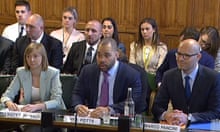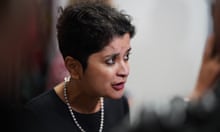Theresa May will urge G7 leaders to tell technology firms that they should do more to suppress extremist content online, arguing that fight against Islamic State is shifting from the “battlefield to the internet”. The prime minister will tell fellow leaders at the summit in Sicily that every country should encourage companies like Facebook, Google and Twitter to block users who post extremist content and report individuals to authorities if there is evidence of imminent harm.
Addressing a small group of powerful counterparts, including Donald Trump and new French president, Emmanuel Macron, May will argue that more has to be done to tackle the threat posed by extremist content online in the aftermath of the Manchester Arena attack.
The prime minister believes that cooperation between major industrial countries could help force the social media companies to:
- develop tools that could automatically identify and remove harmful material based on what it contains and who posted it
- tell the authorities when harmful material is identified so that action can be taken, and
- revise conditions and industry guidelines to make them absolutely clear about what constitutes harmful material.
Many of the initiatives reflect concerns about Facebook in particular, which were exposed in a leak to the Guardian of the social media company’s training manuals. These pointed to discrepancies between the way acts of violence, bullying and cruelty are handled by the company and the sheer scale of problems it has to deal with.
The general election campaign is due to renew in earnest today, with less than a fortnight to go before the UK goes to the polls. Labour leader Jeremy Corbyn will return to the fray with a speech in London that will court controversy by returning to his long-held view that British military intervention in the Middle East has fuelled the surge in terrorism. “Many experts, including professionals in our intelligence and security services, have pointed to the connections between wars our government has supported or fought in other countries and terrorism here at home,” he will say.
“We must be brave enough to admit that the ‘war on terror’ is simply not working. We need a smarter way to reduce the threat from countries that nurture terrorists and generate terrorism.”
Corbyn will also point to recent cuts in funding for the police and health services, saying these too impact public safety. “Austerity has to stop at the A&E ward and at the police station door. We cannot be protected and cared for on the cheap.”
Meanwhile, government sources have said that May would want to see social media companies that do not take action over inflammatory content to be held to account – although they added they hoped that change would come about voluntarily and that she was not advocating financial penalties at this stage.
“The prime minister will say that the threat we face is evolving rather than disappearing as [Isis] loses ground in Iraq and Syria. The fight is moving from the battlefield to the internet,” said a senior government source. “What she wants the G7 nations to do is to move towards a common approach focused on the need to defeat [Isis]. In particular she wants to use G7 to call for the members to adopt a collective approach when working with tech companies on this agenda, and she will say that the industry has a social responsibility to do more to remove harmful content from its networks.”
No 10 believes that a G7-wide approach will put significant pressure on companies to take action, but it is unclear whether May is likely to have any luck in persuading Trump to take action against the major companies based in the US. May will hope to secure support from Trump after the US president showed solidarity during a meeting of Nato heads of government in Brussels on Thursday – and apologised for a string of leaks by his country’s intelligence agencies relating to the investigation into the Manchester attack.
Describing the “alleged leaks” coming out of government agencies as “deeply troubling”, Trump said he had asked the Department of Justice to initiate an inquiry. The president added: “There is no relationship we cherish more than the special relationship between the United States and the United Kingdom.”
Trump also told May that “all the nations grieve with you and stand with you” as he asked leaders gathered by a memorial of 9/11 and the Berlin wall to remember the victims of Manchester with a period of silence.
He also admitted that more had to be done to counter extremism, claiming that countries were struggling to contain the terror threat. “You have thousands and thousands of people pouring into our various countries and spreading throughout and in many cases we have no idea who they are. We must be tough, we must be strong and we must be vigilant.”
In March No 10 said companies like Facebook and Google “can and must do more” to remove inflammatory material from the web and that it was up to them to respond to public concern. “Social media companies have a responsibility when it comes to making sure this material is not disseminated and we have been clear repeatedly that we think that they can and must do more,” a spokesman said.
“We are always talking with them on how to achieve that. The ball is now in their court. We will see how they respond.”
The Manchester bombing, which followed an earlier terror attack in Westminster, has reignited concern about the easy availability of material promoting violent extremism online. The government is pressing for a consensual approach, with sources as yet unwilling to comment on the possibility of legislation if social media companies fail to tighten their procedures.
The question of social media use by terrorists came up after the murder of Lee Rigby in London. A senior MP later accused Facebook of failing to pass onmessages that could have provided information to thwart the attack.










